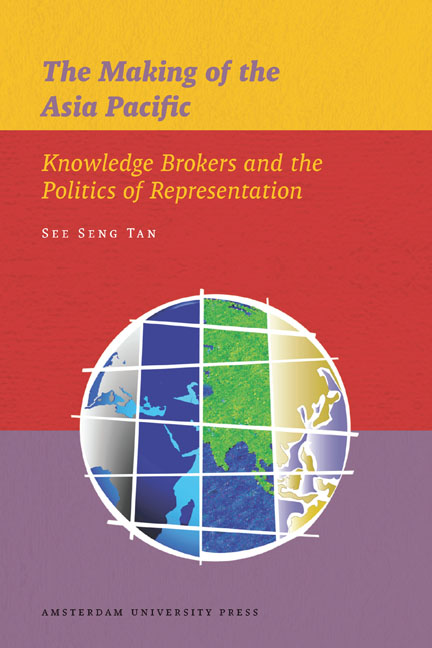Book contents
- Frontmatter
- Dedication
- Contents
- List of Tables
- Acknowledgements
- 1 Introduction: From ‘Pacific Asia’ to ‘Asia Pacific’
- 2 The Desire for Essence
- 3 Knowledge Networks as Agents of Representation
- 4 Representing the ‘Asia Pacific’
- 5 Representing Sovereign States
- 6 Representing the ‘In/Human’ Faces of Asia Pacific Security
- 7 Representing the ‘Authority’ of Knowledge Networks
- 8 Conclusion: A Plea in Three Parts
- Notes
- Bibliography
- Index
- Miscellaneous Ensmatter
1 - Introduction: From ‘Pacific Asia’ to ‘Asia Pacific’
Published online by Cambridge University Press: 10 December 2020
- Frontmatter
- Dedication
- Contents
- List of Tables
- Acknowledgements
- 1 Introduction: From ‘Pacific Asia’ to ‘Asia Pacific’
- 2 The Desire for Essence
- 3 Knowledge Networks as Agents of Representation
- 4 Representing the ‘Asia Pacific’
- 5 Representing Sovereign States
- 6 Representing the ‘In/Human’ Faces of Asia Pacific Security
- 7 Representing the ‘Authority’ of Knowledge Networks
- 8 Conclusion: A Plea in Three Parts
- Notes
- Bibliography
- Index
- Miscellaneous Ensmatter
Summary
The idea of a beginning, indeed the act of beginning, necessarily involves an act of delimitation by which something is cut out of a great mass of material, separated from the mass, and made to stand for, as well as be, a starting point, a beginning … (Said 1979: 16)
Whose ideas matter? Such is the title of an acclaimed work on agency and power in international relations (Acharya 2009). Ideas and visions, championed by interested institutions and individuals with power and position or backed by those with such, could conceivably emerge as the preponderant ideology of a given environment and even come to be accepted in time as, if you will, ‘the natural order of things’. But as this book will show, political ideas, agency and power vis-à-vis the ‘Asia Pacific’ do not necessarily lend themselves to the seemingly neat and self-evident resolutions that support the standard chronicles that adorn the pages of college textbooks and scholarly tomes on Asia Pacific international affairs. A transnational hub of knowledge communities, by dint of their focused policy-oriented advocacy, contributed to the making of the regional security architecture of post-Cold War East Asia (or Pacific Asia). Aided by the ideas and ideals of like-minded academics, their efforts effectively represented (some might say misrepresented) the East/ Pacific Asian region, wherein most of the activities in security regionalisation tended to be concentrated, as the ‘Asia Pacific’, thereby fostering the impression of a considerably wider regional security domain than the physical limits of East/Pacific Asia might have allowed.
Accounts differ, but most propose that the Asia Pacific idea had its beginnings in policy discourses in the late 1980s, possibly a year or two before the Cold War ended. Taken to denote an expanse of staggering complexity and proportions, the regional idea enjoyed prominence during much of the 1990s thanks in no small part to networks of security studies institutes and policy think tanks whose dialogical, consultative and cooperative activities helped produce a precise knowledge about the region and its dominant modalities of collective existence.
- Type
- Chapter
- Information
- The Making of the Asia PacificKnowledge Brokers and the Politics of Representation, pp. 13 - 26Publisher: Amsterdam University PressPrint publication year: 2013



